Special report: The evolution of Kresge College
Above: An architect’s rendering showing part of the completed Kresge renewal project.Kresge College is best known for its distinctive architecture, along with its legacy of experimental teaching and strong sense of community. But the village-like college nestled into the redwood forest of the UC Santa Cruz campus has long been showing its age. Hoping to reinvigorate the college, address deficiencies, and update it to comply with current code, the university is undertaking a two-phased project balancing new construction, renovation, and selective removal. The project is designed to enhance, and grow, the college’s living-learning environment while providing more space for much-needed student support, residential, and academic programs that embrace its history while meeting the needs of today’s
students.
To see what the renewal entails, view our detailed special report, which includes a story, photos, renderings, a video, and podcasts. Find it at reports.news.ucsc.edu/kresge.
On the menu: Food security
Cowell College is sporting a new cafe: the Cowell Coffee Shop for the Peoples, an innovative, free food store and cafe designed to address food access issues for students.
The cafe offers free coffee, prepared meals, a juicing station, and pastries—all intended to provide low-income students with healthy options and alleviate stressors related to feeding themselves, which can ultimately hurt their academic pursuits.
Because of the meteoric housing costs in Santa Cruz, students living both off and on campus attempting to get by with less will make cuts in their food budget.
The 2016 Global Food Initiative—a survey of approximately 63,000 students across the UC system—found that 44 percent of undergraduates and 26 percent of graduate students had experienced food insecurity at some point during college. At least 2,000 UC Santa Cruz students experience food insecurity.
The Cowell Coffee Shop also runs workshops about food preparation, knife use, and other skills necessary for students to feed themselves.
Find more UC Santa Cruz news at news.ucsc.edu. Have news delivered straight to your inbox! Subscribe to the UC Santa Cruz e-newsletter at news.ucsc.edu/newsletter
Students got game

Stumpjumper: The Video Game
When the bicycle company Specialized wanted a videogame to accompany the introduction of their latest Stumpjumper mountain bikes, they approached the game design program at UC Santa Cruz. Nathan Altice, professor of computational media in the Baskin School of Engineering, volunteered to organize a team of students to take on the project.
Specialized wanted a retrostyle game like the old 1980s Nintendo games, because the Stumpjumper line debuted in the early 1980s as the first mass-produced mountain bikes.
Altice selected a group of talented students who he thought would be able to handle the project on top of their regular school work, and the team spent the next six months developing the game.
Specialized released “Stumpjumper: The Video Game” in October. It’s a two-dimensional, lane-based racing game inspired by an old Nintendo motocross game from the 1980s calledExcitebike. A storyline involves winning the big race to save the hometown trails from “Big
Corporation” developers.
Registering voters, changing lives

Voter education, registration, and outreach was a primary focus of the nonpartisan Central
Valley Freedom Summer, which promoted civic engagement among the valley’s youth. Photo by Arnold Morrison
California’s Central Valley is plagued by poverty, unemployment, pollution, and high rates of youth incarceration. For most kids who grow up there, the goal is to get out. But this last summer, 25 UC Santa Cruz and UC Merced students turned that narrative on its head and returned home, eager to give back to their communities.
Through the nonpartisan Central Valley Freedom Summer project, students spent three months empowering youth. They interned with community organizations and reached out to high school students to register young voters and teach them about civic engagement. They hosted youth summits, conferences, and workshops about grassroots organizing. They sponsored art events and mural paintings, all with an eye toward beautifying their hometowns and energizing underserved residents. Modeled after Freedom Summer, the Mississippi voter-registration drive that began in 1964, Central Valley Freedom Summer was
Honoring a visionary
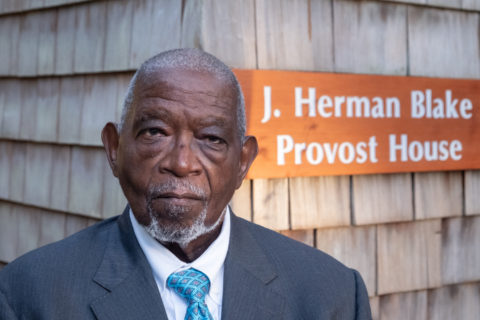
Above: Founding Oakes College Provost J. Herman Blake. Photo by Kurtz Photographics
Founding Oakes College Provost J. Herman Blake was the guest of honor in a recent ceremony rededicating the Oakes Provost House and renaming it the J. Herman Blake Provost House. A crowd of 200 cheered Blake, who heard testimonials from campus figures including Chancellor George Blumenthal and emeritus biology professor William T. Doyle, a faculty member when the campus opened in 1965. Doyle suggested the name change and funded all related
expenses.
Blake started at UC Santa Cruz in 1966 as a professor of sociology. Six years later he became Oakes’s founding provost. Along with a team of forward-thinking colleagues, he helped the college set forth on the path it follows to this day, with a strong emphasis on inclusion and academic excellence. Blake remained the provost of Oakes until 1984, when he left to become president of Tougaloo College.
Listen to our podcast with Blake recounting his memories and addressing the crowd at the ceremony: http://bit.ly/OakesPodcast.
Smith Society celebrates 20 years of support
In 1999, former foster youth Bill Dickinson (Cowell ‘68, philosophy) started a scholarship that went to three students who had also been in the foster care system.
The scholarship grew into a scholastic society and has since supported 483 “fellows.”
The Smith Society is named for the beloved founding provost of Cowell College, Page Smith, and his wife, Eloise. Fellows, who are independent students including homeless, foster or
runaway youths, orphans, or wards of the court, receive services including mentorship and housing assistance. The program is remarkably successful—in contrast to dismal national graduation rates for foster youth, nearly every Smith fellow has earned a degree.
Matilda Stubbs, one of the first fellows, recently earned a Ph.D. at Northwestern University and trains social workers. Stubbs (Porter ‘05, anthropology) said the key to the Smith Society’s effectiveness is bringing together students and alumni with common experiences.
“From the first meeting, I felt a really profound sense of belonging, of understanding,” she said.
The Smith Society will celebrate its 20th anniversary at its annual reunion during Alumni Weekend (April 26–28) and is seeking new donors.
Visit smithsociety.ucsc.edu.
An app to aid the blind
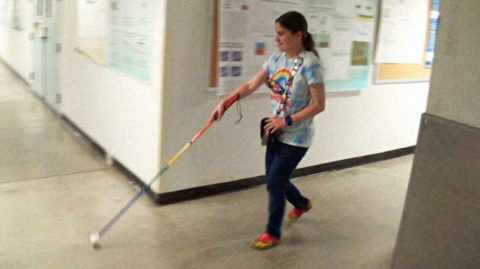
A blind participant tests a path backtracking app developed at UC Santa Cruz. Photo courtesy Roberto Manduchi
“Have you ever been to the Baskin Engineering building basement? I took some friends of mine who are blind down there and tried to get them lost,” says Roberto Manduchi, professor of computer science and engineering in the Baskin School of Engineering.
Finding their way out of the subterranean maze of humming machines and convoluted corridors beneath the engineering building would ordinarily be a nightmare for many people with visual impairment, but Manduchi’s 12 participants weren’t lost for long. They were each equipped with an app-based system that used an iPhone’s inertial sensors to guide them back.
The backtracking system was developed by a graduate student in Manduchi’s Computer Vision Lab, Germán Flores, who earned his Ph.D. in 2017 and is currently at IBM’s Almaden Research Center. A new $1.1 million grant from the National Institutes of Health is now funding Manduchi’s ongoing work to develop the system into an iPhone app that will support both path backtracking and map-based wayfinding.
Fear and loathing at UC Santa Cruz
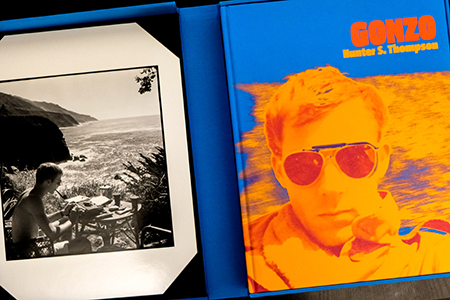
Samples from the Eric C. Shoaf Collection of Hunter S. Thompson. Photo by M. Powell
UC Santa Cruz Special Collections & Archives recently received an 800-volume collection of works by famed author and journalist Hunter S. Thompson.
The founder of “Gonzo” journalism, an intensely personal style of writing that often includes the reporter as part of the story, Thompson is perhaps best known for his 1971 book, Fear and Loathing in Las Vegas, as well as his cultural and political contributions to Rolling Stone magazine, which turned him into a counterculture icon.
The campus received the gift from Eric C. Shoaf, who is the author of Gonzology, an extensive bibliography of Thompson’s work.
In addition to first editions, translations, and pirated copies of Thompson’s books, the collection also includes rare printed materials.
Shoaf had no previous connection to the campus, but he said, “I found UC Santa Cruz to be an institution young enough to accept the collection and to appreciate it for what it represents and how it dovetails and augments the Grateful Dead archive.”
Beyond the end of the world
Catastrophic environmental breakdown, mass species extinction, financial collapse, racist separatism, global nuclear war … there is much speculation these days that we are living at the end of democracy, liberalism, capitalism, a cool planet, and civilization as we know it. What are our chances for survival? How can we envision the unimaginable, and what will life look like in the near and distant future?
Faculty and students at California’s UC Santa Cruz will explore these urgent issues over the next two years thanks to a $225,000 grant from the Andrew W. Mellon Foundation to support “Beyond the End of the World”—a Sawyer Seminar on the Comparative Study of Cultures.
The project will bring leading international thinkers and cultural practitioners to UC Santa Cruz to deliver a series of public lectures, and will culminate in an art exhibition and interdisciplinary conversation titled “Beyond the End of the World: Approaches in Contemporary Art.”
Making art, making change
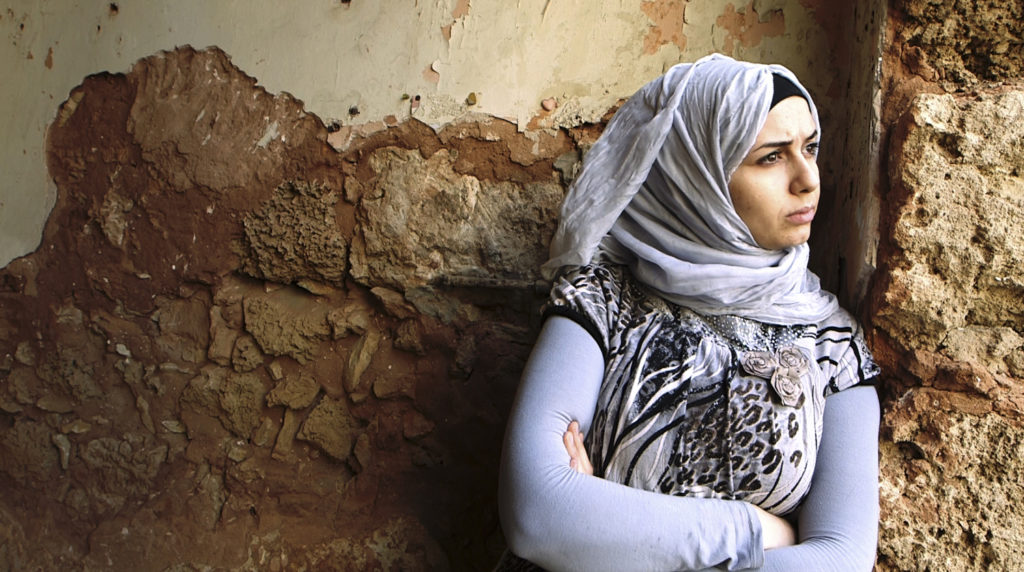
Above: Still from “We Are Not Princesses”
We Are Not Princesses, the first feature film by UC Santa Cruz alumna Bridgette Auger (M.A.
’11, SocDoc), had its world premiere in November at DOC NYC, the largest documentary film festival in the United States.
The film is about four Syrian women, living as refugees in Beirut, Lebanon, who come together to tell their personal stories of love, loss, despair, and hope through exploration of the ancient Greek play Antigone by Sophocles. Shot over three months in the autumn of 2014, the film uses intimate footage and animation to show how these resilient women are picking up the pieces of their lives and putting them back together—despite the seemingly endless tragic conditions back home in Syria. Auger, an artist and filmmaker committed to using art for social change, has lived in the Middle East for several years, covering the Arab Spring in Egypt and Libya, as well as the refugee crisis from the conflict in Syria, through photography and video.
Field work of dreams
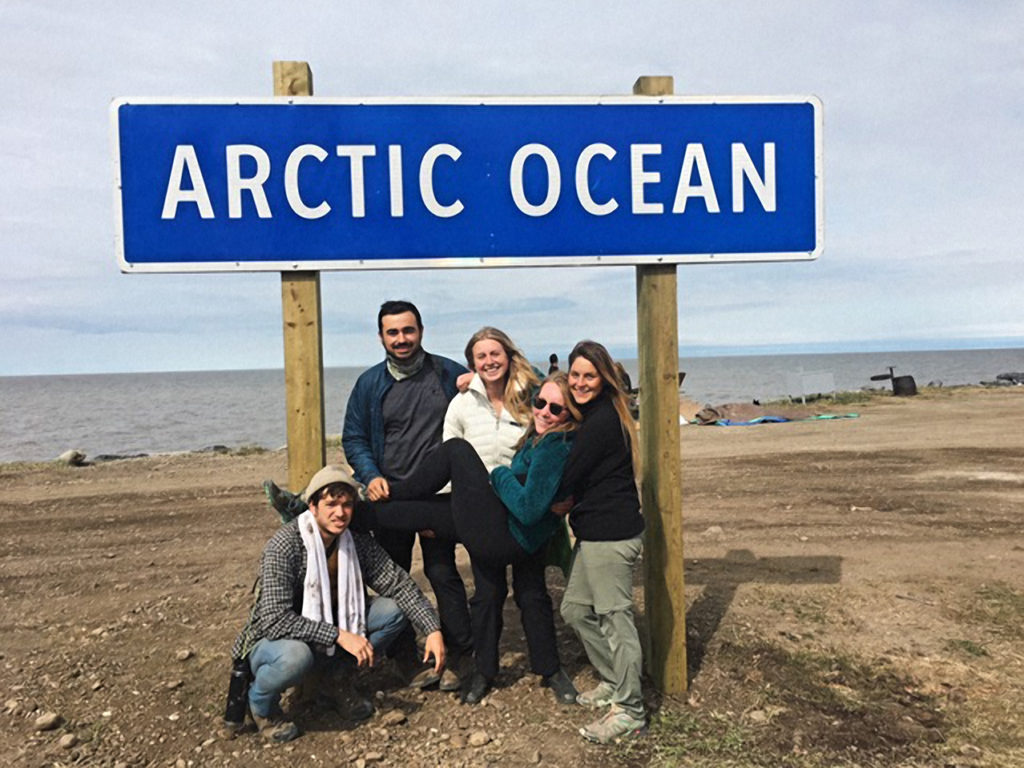
Above: Professor Beth Shapiro’s class traveled 2,800 miles through Alaska and the Yukon territory to the Arctic Ocean
They got cold and wet, slogged through mud and muck, were eaten alive by mosquitoes, and they all agreed it was one of the best experiences of their lives.

Above: Anthony Aguirre. Photo by N. Gonzales“337” /> Above: Professor Beth Shapiro with students. Photo courtesy Beth Shapiro
Thirteen UC Santa Cruz undergraduates led by Beth Shapiro, professor of ecology and evolutionary biology, traveled 2,800 miles through Alaska and the Yukon territory last summer, doing fieldwork at research sites and studying the effects of climate change in the far north.
Offered for the first time last year, Shapiro’s course on arctic ecology and environmental change started in the classroom in spring 2018. The course covered the region’s ecology, geology, geography, ice ages, animal migrations, human history, science communication, and more.
In June, they gathered in Canada’s Yukon territory to start the field component. The three-week camping and road trip took the class to remote research stations, gold mining sites where the bones of woolly mammoths and other ice age animals are being uncovered, the historic mining town of Dawson City, and up the Yukon’s famed Dempster Highway all the way to the Arctic Ocean.
Putting study into practice
The water crisis in Flint, Michigan, is an ongoing tragedy. Yet just down the highway from UC Santa Cruz, numerous communities in the Salinas Valley Basin lack access to affordable clean water.
In a new model of community engagement, Environmental Studies faculty are harnessing the talent of graduate students to help change that.
Associate Professor Elliott Campbell and Professor Chris Benner co-taught a 2018 springquarter class to connect firstyear graduate students with environmental problems in the region and to foster collaboration with off-campus stakeholders.
Water in the Salinas Valley Basin is a persistent problem, and students examined the history and politics of who gets access to clean water, as well as the human impacts of inequities in the system.
“This isn’t just homework, it’s dealing with real problems,” said Campbell, who holds the Gliessman Presidential Chair in Water Resources and Food Sustainability.
To explore and understand the forces shaping access to water for disadvantaged communities, Campbell and Benner renewed ties with members of the San Jerardo Housing Cooperative, a farmworker community southeast of Salinas that has struggled for almost 30 years to get clean water.
Alumna leads Mexico’s anti-corruption efforts
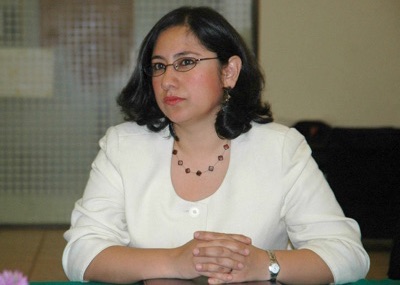
Irma Sandoval will enlist the help of Mexico’s citizenry to improve the monitoring of public works contracts and the use of public funds. Photo courtesy of Irma Sandoval
When Andres Manuel Lopez Obrador took office as the president of Mexico on Dec. 1, alumna Irma Sandoval became the front line in that country’s war on corruption.
Sandoval (Ph.D. ‘06, politics), has been a professor and director of the Center for the Study of Corruption at the National Autonomous University of Mexico. As comptroller general, she is now a key member of Lopez Obrador’s cabinet, leading the ministry that functions as the government watchdog for civil servants.
Lopez Obrador ran on an anti-corruption, anti-violence platform and won a landslide victory.
Sandoval takes pride in having studied at the University of California, and she is particularly proud to be a Banana Slug. “The richness of the multidisciplinary approaches that we study at UC Santa Cruz, the social and environmental consciousness that the university fosters, and the cultural diversity that we embrace at Santa Cruz—all are irreplaceable values that have guided my professional career,” she said.
Sandoval’s husband, John Ackerman, who teaches law at the National Autonomous University of Mexico, is also a Slug (Ph.D. ’07, sociology).
In memoriam: ‘Founding father’ John Dizikes

John Dizikes. Photo by David Harsany
John Dizikes, a professor emeritus of American studies and a founding member of the faculty of UC Santa Cruz, died at his home in Santa Cruz on December 26, 2018. He was 86.
Dizikes was a Harvard-trained historian who joined UC Santa Cruz the summer before the campus first opened its doors to students in 1965.
Over the course of 35 years, Dizikes was a professor of history, a professor and cofounder of the American Studies Department, provost of Cowell College from 1979-83, and Chair of the Council of Provosts.
“Everyone thinks of John as one of the founding fathers of the campus,” recalled his friend and colleague of 50 years Todd Newberry, professor emeritus of biology and a fellow founding faculty member.
Dizikes was a young assistant professor of history at the University of Connecticut when he decided to make the leap and join the Santa Cruz campus.
“Several friends said, ‘For God’s sake, don’t go there, you’ll end up doing the plumbing,’” he recalled during the campus’s 50th anniversary celebration.
“Of course they were right, but what they didn’t realize was that it was incredibly exciting to start a place where we were relatively free to do new things.”

